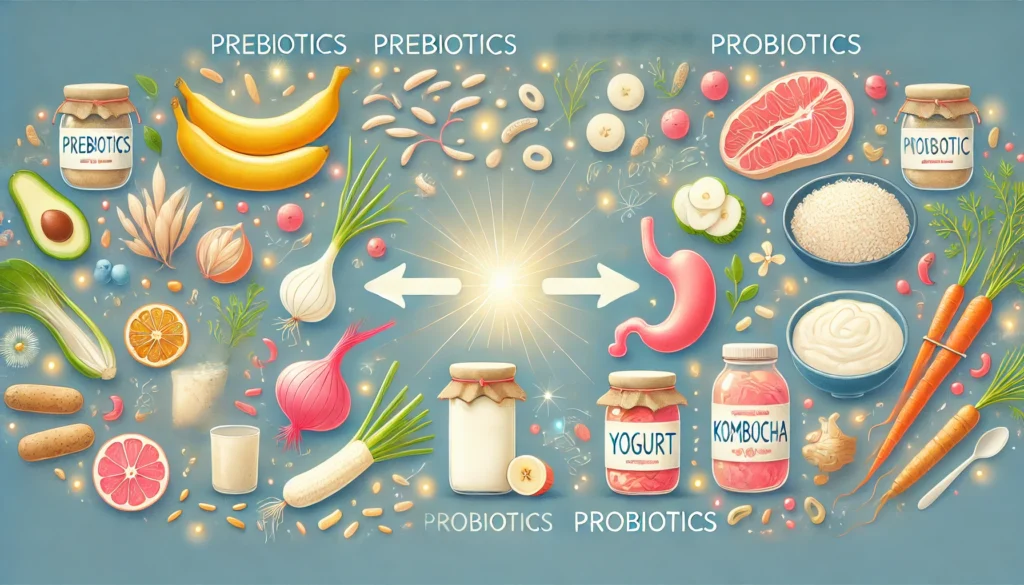Gut health is having a moment—and for good reason. A healthy gut isn’t just about digestion; it’s linked to immunity, mental health, and even skin clarity. But with terms like prebiotics and probiotics floating around, it’s easy to get confused. A 2024 study by the International Scientific Association for Probiotics and Prebiotics (ISAPP) found that 70% of people don’t know the difference between the two—or how to use them for better health. Let’s break it down and explore why both are essential for a thriving gut.
What Are Probiotics?
The Good Bacteria
Probiotics are live microorganisms (like bacteria and yeast) that support a healthy gut microbiome. They’re found in fermented foods and supplements.
Key Benefits
- Improve digestion and nutrient absorption.
- Boost immune function.
- Reduce symptoms of IBS and bloating.
Top Sources
- Yogurt (with live cultures).
- Kefir.
- Sauerkraut.
- Kimchi.
- Probiotic supplements (e.g., Culturelle).
What Are Prebiotics?
Food for Good Bacteria
Prebiotics are non-digestible fibers that feed the beneficial bacteria in your gut. Think of them as fertilizer for your microbiome.
Key Benefits
- Promote the growth of good bacteria.
- Enhance calcium absorption for stronger bones.
- Support weight management by improving satiety.
Top Sources
- Garlic.
- Onions.
- Bananas.
- Asparagus.
- Prebiotic supplements (e.g., Prebiotin).
Why You Need Both
The Synergy Effect
- Probiotics add good bacteria to your gut.
- Prebiotics feed and sustain those bacteria.
- Together, they create a balanced, thriving microbiome.
Beyond the Gut
- Mental Health: A healthy gut produces serotonin, the “feel-good” hormone.
- Immunity: 70% of your immune system resides in your gut.
- Skin Health: A balanced microbiome reduces acne and inflammation.
Signs Your Gut Needs Help
Common Symptoms
- Bloating, gas, or constipation.
- Frequent infections or low immunity.
- Mood swings or brain fog.
- Skin issues like acne or eczema.
️ How to Fix It
- Eat Fermented Foods: Incorporate yogurt, kefir, or kombucha daily.
- Add Prebiotic-Rich Foods: Include garlic, onions, and bananas in meals.
- Consider Supplements: Use high-quality prebiotic and probiotic supplements.
Tools to Boost Your Gut Health
| Tool | Purpose | Why It’s Useful |
|---|---|---|
| Seed Synbiotic | Combines prebiotics + probiotics | Designed for gut and overall health. |
| Gut Microbiome Test | Analyzes gut bacteria | Identifies imbalances and recommendations. |
| MyFitnessPal | Tracks prebiotic-rich foods | Helps you meet daily fiber goals. |
Expert Insights: Gut Health Matters
“Your gut is your second brain. A healthy microbiome doesn’t just improve digestion—it impacts your mood, immunity, and even your skin.”
– Dr. Emeran Mayer, Author of The Mind-Gut Connection.
“Prebiotics and probiotics work best together. Think of them as a dynamic duo for your gut.”
– Dr. Mary Ellen Sanders, Executive Science Officer at ISAPP.
Real-Life Benefits of a Healthy Gut
1. Better Digestion
A balanced microbiome reduces bloating, gas, and irregularity.
2. Stronger Immunity
Good bacteria fight off harmful pathogens and infections.
3. Improved Mental Health
A healthy gut produces neurotransmitters like serotonin, boosting mood.
See also The Mental Health Benefits of Nature: Why You Need More Green Time
The Bottom Line
Prebiotics and probiotics are two sides of the same coin—both are essential for a healthy gut. By incorporating both into your diet, you’ll not only improve digestion but also boost immunity, mood, and overall well-being. So, feed your gut what it craves: a mix of good bacteria and the fuel to keep them thriving.



